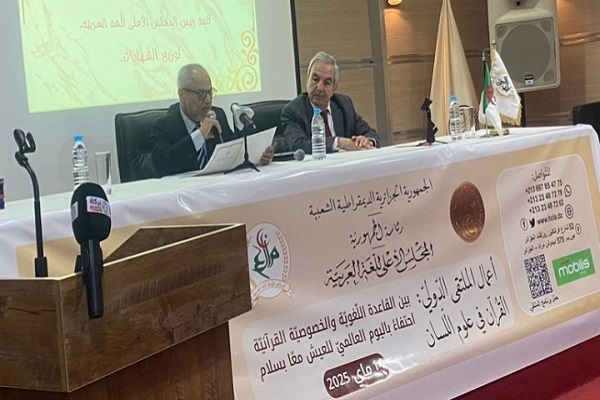Algeria Conference Investigates Quran’s Role in Preservation of Arabic

Attended by scholars and academic figures from Algeria and a number of other Arab and Muslim countries, it was held at the Supreme Council of the Arabic Language of Algeria in the capital Algiers earlier this week.
The conference discussed the linguistic, rhetorical and semantic aspects of the Quran, its impact on the emergence and development of the Arabic language and its role in strengthening the values of coexistence and tolerance among nations.
Mohammad Harath, the chairman of the conference, noted that the scientific committee of the conference accepted 39 papers from different universities in the country and foreign countries, including Qatar, Sudan, Saudi Arabia, Iraq, Turkey, Niger, Egypt and Libya.
He added that the event highlights the special relationship between language and its sciences and the Quran and its characteristics in linguistic studies, in terms of phonology, spelling, syntax, rhetoric, semantics, semantics and other linguistic sciences.
He said that since the revelation of the Quran, scholars have recited, memorized, studied and explained it.
“This has led to the emergence of sciences that were previously unknown, and other sciences that had not yet flourished have flourished. Linguistics has also been a means of understanding and studying the Quran.”
Sheikh Mohammed al-Mamun al-Qasimi al-Hassani, the head of Algiers’ Grand Mosque, also addressed the conference, saying that the Quran was revealed in plain Arabic and its style is unique in terms of structure and rhetoric.
He added that the Quran is not limited to the aspects of belief, law and morality, but is also related to the Arabic language, and therefore this language has the merit of preserving and recognizing its various aspects.
The Quran is a call for peaceful coexistence among people regardless of their religious views, he said, adding that when we connect the linguistic character of the Quran with human values, we recognize the precision of the language of the Quran and its contribution to the creation of coexisting concepts.
Sheikh Abdul Halim Qabbah, the president of the Algerian Association of Muslim Scholars, spoke about the nature of the Quran’s miracles, including the impact of the Quran’s recitation on those unfamiliar with the Arabic language.
Read More:
He also talked about another miracle of the Quran, namely the legal terms mentioned in the Quran.
Emphasizing that the Arabic language is the container of the Quran, whose depth cannot be understood without the knowledge of the Arabic language, he called for deeper studies on the topic of the conference.
Saleh Balaid, president of the Supreme Council of the Arabic Language of Algeria, was another speaker at the event.
He announced the publication of a book by the council containing all the papers presented at the conference.
Balaid said about the theme of the conference that the Quran is an infinite ocean whose concepts are endless, adding that there are many miracles in it that cannot be fully understood.
The book continues to be useful to researchers as they explore its wonders and mysteries that never end, he stated.
4282727



